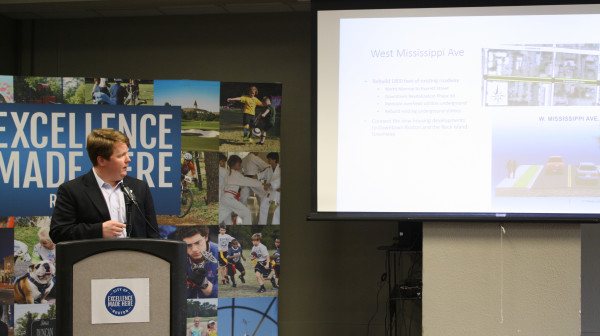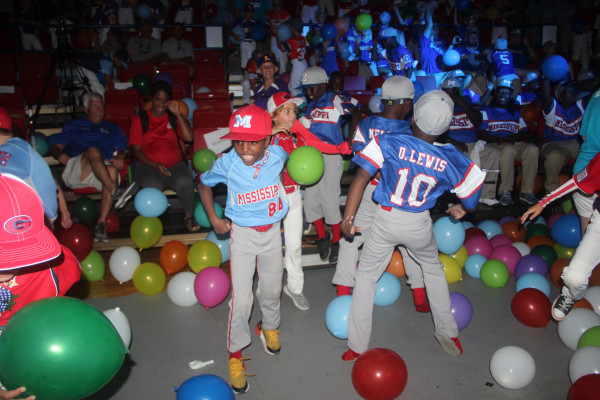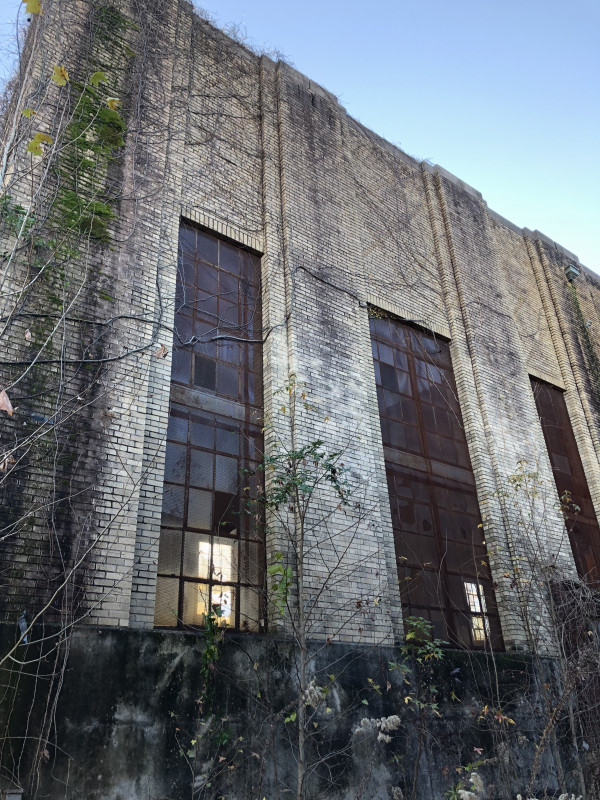2019 Year-in-Review: Ruston gets first BUILD grant

Leader photo by NANCY BERGERON
Andrew Halbrook, Ruston’s technology engineering manager, explains the components of the Monroe Street Corridor project during a November press conference. The city learned it had won a $17.2 million federal BUILD grant to help fund the work. The grant is the first of its kind to be awarded to Ruston.

Leader photo by T. SCOTT BOATRIGHT
Pictured are players from multiple states and teams dancing and having fun with balloons that were dropped during the opening ceremony for the Dixie Youth Baseball World Series played at the new Ruston Sports Complex this summer.

Submitted photo
Years of disuse have worn down the exterior of Ruston’s old diesel power plant located on East Mississippi Avenue. However, the structure remains sound according to city officials.
The receipt of its first Better Utilizing Investments to Leverage Development federal transportation grant, continued work on the sports complex, hosting the Dixie Youth World Series, and the implementation of two sales taxes were among the big events involving the city of Ruston in 2019.
Here’s a look back:
On Jan. 1, a new 1.75% sales tax on local restaurant sales and hotel stays kicked in.
The 10-year-tax will generatemoney tofund Phase II of Ruston’s still-emerging sports complex.
Mayor Ronny Walker, who fashioned the plan for creating an economic development district made up of restaurants and hotels, imposing the tax and using the revenue generated to add a gymnasium, water feature and combined veteran-senior center to the sports facility, estimated the restaurant tax would cost city residents about $18 or less annually on average.
On April 1, a halfcent sales tax exclusive to the Cooktown Road Economic Development District took effect.
Shoppers at the Ruston Marketplace shopping center — that’s what the Cooktown Road district is — pay a half-cent more sales tax there than if they shop elsewhere in town.
But the city won’t get anything off the Cooktown Road district tax until after the first $3 million goes to the developer to offset project costs.
That agreement was part of the incentive used to lure Hutton, a Tennessee-based developer, to Ruston.
The tax district was created at Hutton’s request.
Sports complex Phase II
Despite the first phase of the Ruston Sports Complex still being unfinished, the Board of Aldermen and city administration forged ahead with Phase II of the project in 2019.
Phase II is the multicourt gymnasium, water feature and combined senior/veterans center.
In February, aldermen approved a resolution asking the Louisiana Bond Commission to allow Ruston to issue up to $20 million in sales tax revenue bonds to fund the Phase II projects. The commission OK’d the request Feb. 21.
The bond issue is funded by proceeds from the 1.75% sales tax levied on eateries and hotels in the city limits. But because the eatery and hotel tax was new and had no collection history at the time, the bond issue was also partially secured by money from the threequarter-cent Moving Ruston Forward tax. Voters approved that tax in 2016.
Phase I of the sports complex — the work that was still underway as 2019 drew to a close — is a MRF project; Phase II is not. Phase II is expected to cost $12 million.
In March, the city borrowed its first $10 million; it just borrowed the second $10 million Wednesday.
In April, Ruston won approval from state House and Senate committees on transportation, highways and public works to use a relatively new Louisiana statute that will give the city more say in the Phase II construction.
The construction manager at risk, or CMAR, method is also designed to help contain costs and possibly shorten building time. The process allows the project owner — in this case the city — to choose a contractor without taking bids or being bound to accept a low bidder.
The CMAR approach is based on collaboration and negotiation between a project owner and contractor. In August, aldermen selected Lincoln Builders as the CMAR.
Dixie World Series
Ruston was selected as the site of the 2019 Dixie Youth Baseball World Series in 2017 — even before ground was broken for the sports complex in which it was played.
On July 27, 2019, the two-week-long series began.
The tournament drew approximately 13,000 people and was the biggest event so far at the city’s new — and still unfinished — sports complex. The economic impact: $6.2 million.
In November, Sports Destination Management named the Dixie Youth Worth Series a 2019 Champion of Economic Impact in Sport Tourism.
More than 70 teams from 11 Southern states, including Louisiana, played in the various age-level tournaments.
The $40 million sports complex, located on U.S. 167 South, continued to be plagued by weather delays due to excessive rainfall almost since ground was broken in May of 2018. At one point, the complex was six months behind.
Two tournaments originally scheduled for June of 2019 were cancelled because of rain-related construction delays.
Meantime, work on other parts of the complex, like the tennis courts and soccer fields, was stopped to concentrate on the baseball fields so that they would be ready for the World Series.
The complex hosted its first tournament over the July 4 weekend. Former New York Mets pitcher George Stone, of Ruston, threw the opening pitch.
In the midst of the World Series, Ivanabelle Ace Pulley was born.
Josh and Kristin Pulley knew they were taking a chance.
Kristin Pulley could either stay home in Springfield, Tennessee, await the birth of her daughter and definitely miss watching her middle son play in the Dixie Youth World Series, or she could accompany her coach-husband to Ruston and just take a chance Ivanabelle Ace wouldn’t come before her Aug. 4 due date.
But she did. Ivanabelle Ace arrived at 3:56 p.m. July 29 at Northern Louisiana Medical Center.
Josh Pulley coaches the Greenbrier, Tennessee, Coach Pitch 8U. The Pulleys’ middle son Braylon, 9, better known as “Bear,” is on the team.
Even before leaving for Ruston —it’s a roughly 540-mile trip —the Pulleys discovered NLMC was within minutes of both their hotel and the Ruston Sports Complex, and that the hospital delivered babies.
“We knew the hospital was on the way to the ballpark,” Josh Pulley said. “We had scoped it out.”
Abandoned plant gets new life
Ruston’s abandoned diesel power plant came a step closer to new life in August. The Board of Aldermen agreed to sell the approximately 3-acre site on East Mississippi Avenue to Monroe developer Michael Echols for $337,000.
Echols plans to turn the plant into a mixedused residential and commercial site. He told aldermen he envisions a three-phase project that will ultimately include as many as 110 housing units, as well as retail and commercial space.
At Echols’ request, Ruston’s Historic District Advisory Commission sought and obtained listing of the plant on the National Register of Historic Places. Properties on the register are eligible for state and federal rehabilitation tax credits.
The diesel plant was placed on the register in July.
BUILD grant
In November, the city learned it had had won a $17 million federal Department of Transportation grant for the Monroe Street Corridor Project.
The grant is the first of its kind awarded to a north Louisiana city.
The application was made by the city in partnership with Louisiana Tech University. Both Tech and the city will share in a roughly $4.6 million match to meet the total $22 million cost of the project.
But the city’s already chasing an Economic Development Administration grant to cover the match. If that money comes through, the entire project will be federally funded.
The BUILD grant means the seven-phase Monroe Street project includes construction of a new two-lane road to connect the I-20 corridor to downtown Ruston, as well as connectors to and through Louisiana Tech’s Enterprise Campus.
Also in the grant is the new bicycle/pedestrian path Tech wants to build alongside a portion of the Kansas City Southernrailroadtrack, as well as installation of underground electrical and fiber optic utilities to provide real-time data on traffic, weather and parking information on the university campus.
During a press conference about the grant, Ruston Mayor Ronny Walker thanked a long list of local, state and federal officials for supporting the project and singled out long-time Ruston businessman James Davison as the person who “made the whole thing happen.”
Walker said it was Davison’s help in opening doors as high up as the White House that helped Ruston get the grant.
The city had applied for a BUILD grant for the Monroe Street project in 2018 but failed to make the final cut.

